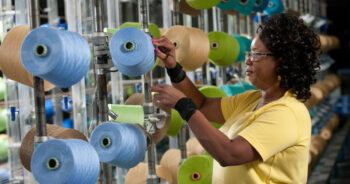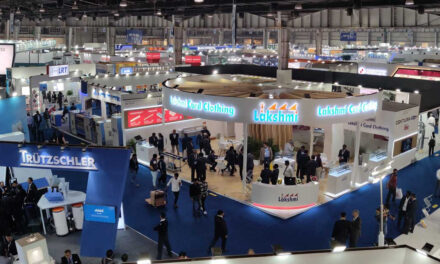 Tai’s visit to Glen Raven’s yarn-spinning manufacturing facility and the headquarters of its Sunbrella brand in Burlington, North Carolina coincided with the USTR’s call for public comments on promoting supply chain resilience.
Tai’s visit to Glen Raven’s yarn-spinning manufacturing facility and the headquarters of its Sunbrella brand in Burlington, North Carolina coincided with the USTR’s call for public comments on promoting supply chain resilience.
The National Council of Textile Organizations (NCTO) explained USTR has highlighted domestic textiles as a critical part of the supply chain and this includes yarns, fabrics, apparel and other finished goods.
NCTO added that it will be part of USTR’s fact-finding investigation into shaping policy tools that could enhance supply chain resilience. For this reason USTR is requesting input on policies that are currently working well for textile and apparel, and those that are not working well.
Ambassador Tai’s visit to the Sunbrella facility was followed by an industry roundtable discussion with other textile executives based in North Carolina to gain insights for shaping the nation’s trade and investment policy initiatives.
Glen Raven CEO Leib Oehmig affirmed the critical role of trade policies in bolstering domestic manufacturing, fostering employment, and driving growth within the textile industry. Oehmig noted: “We are appreciative of USTR’s review of the strategic textile sector as it diligently examines and shapes policies that will undoubtedly have a significant impact on the entire US textile industry.”
“During our tour, we highlighted the importance of Glen Raven’s contribution to our local communities and the overall US economy, while also underscoring the need for strong trade policies to maintain a vibrant domestic supply chain.”
NCTO President and CEO Kim Glas echoed sentiments of gratitude for the administration’s proactive approach and added: “We believe USTR’s development of supply chain resilience policies is a strong step in the right direction for helping secure the US textile supply chain into the future.”
Glen Raven operates five manufacturing facilities across North and South Carolina and employs over 2,500 individuals including a joint venture with soft material solutions provider, Shawmut Corporation. The company is in the process of scaling a $250m capacity expansion initiative to meet growing customer demands.
Oehmig said he was “deeply honoured” to host Ambassador Tai and share how “the right trade policies can help bolster domestic manufacturing facilities” such as his to “facilitate employment and lead to the expansion and growth of this vital manufacturing sector”.
In January, the Americans for Free Trade (AFT) coalition said it was “frustrated” with the short notice the USTR had given to businesses to prepare for an extension to its reinstated and Covid-related exclusions in its China Section 301 investigation and urged USTR to release the results of its four-year tariffs review “immediately”.













